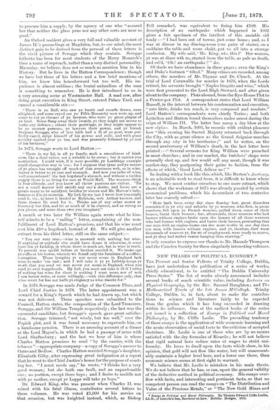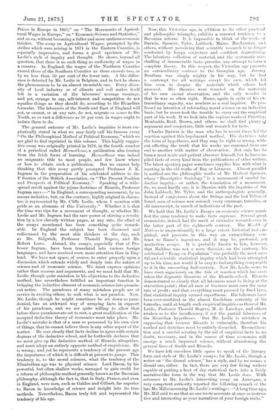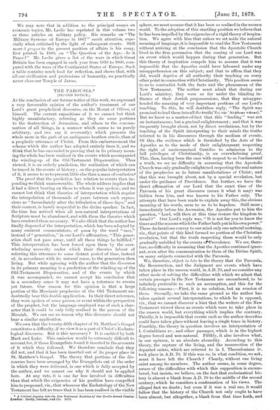NEW PHASES OF POLITICAL ECONOMY.* TILE Provost and Senior Fellows
of Trinity College, Dublin, have just undertaken the publication of a series of works, chiefly educational, to be entitled The Dublin University Press Series." The list of works already announced includes several books of much scientific value, including Lectures on Physical Geography, by the Rev. Samuel Haughton ; and The Mathematical Tracts of the late lames M`Callagh. Trinity College, Dublin, is, in fact, about to make the contribu- tions to scicnice and literature fairly to be expected from the genius which it has long succeeded in drawing within its idfinence. One of the earliest books of the series yet issued is a collection of Essays in Political and Moral Philosophy, by Mr. Cliffe Leslie. The prevailing tendency of these essays is the application of wide economic learning and the acute observation of social facts to the criticism of accepted doctrines. Mr. Leslie is one of those who are by no means satisfied with the dry formulas of Ricardo ; he will not believe that rigid natural laws reduce rates of wages to strict uni- formity. He loves to dwell upon the facts which show, in his opinion, that gold will not flow like water, but will unaccount- ably maintain a higher level here, and a lower one there, than economic science seems at first sight to warrant.
We believe that Mr. Leslie is mistaken in his main thesis. We do not believe that he has, or can, upset the general validity of the deductive method in political economy. His essays over- flow with facts, and interesting and pertinent facts, so that no competent person can read the essays on " The Distribution and Value of the Precious Metals," or " The New Gold Mines and
• Essays in Political and Moral Philosophy. By Thomas Edward OM Leslie, LL.D., of Lincoln'a Inn, Barrister-at-Law. Dublin: Hodges. 1879. Prices in Europe in 1865," on " The Movements of Agricul- tural Wages in Europe," on " Economic Science and Statistics," and so on, without becoming a fuller and more cautious economic thinker. The essay on Agricultural Wages, prompted by the strikes which were arising in 1874 in the Eastern Counties, is especially impressive, and forms a good specimen of Mr. Leslie's style of inquiry and thought. He shows, beyond all question, that there is no such thing as uniformity of wages in .a country. In England, the wages of the Northern Counties -exceed those of the Southern Counties as three exceeds two, or by no less than 50 per cent of the lower rate. A like differ- ence is detected by Mr. Leslie in Belgium, and in fact he shows the phenomenon to be an almost invariable one. Every diver- sity of local industry or of climate and soil makes itself felt in a variation of the labourers' average earnings, and yet, strange to say, self-interest and competition do not equalise things as they should do, according to the Ricardian formulas. The labourers of the South and East of England will not, or cannot, or at any rate, do not, migrate ea mouse to the North, as so vast a difference as 50 per cent. in wages ought to induce them to do.
The general outcome of Mr. Leslie's inquiries is more em- phatically stated in what we may fairly call his famous essay " On the Philosophical Method of Political Economy," which we are glad to find reprinted in this volume. This highly sugges- tive essay was originally printed in 1876, in the fourth number of a periodical called Hermathena, a publication also issuing from the Irish focus of learning. Hermathena was indeed an enigmatic title to most people, and few knew where or how to obtain such a publication. But we cannot help thinking that this essay partly prompted Professor J. K. Ingram in the preparation of his celebrated address to the F Section of the British Association, on " The Present Position and Prospects of Political Economy." Speaking of a wide- spread revolt against the jejune doctrines of Ricardo, Professor Ingram says :—" In England, a corresponding movement, by no means imitative, but, on the contrary, highly original in charac- ter, is represented by Mr. Cliffe Leslie, whom I mention with pride as an alumnus of this University." Whether it is that the time was ripe for a movement of thought, or whether Mr. Leslie and Mr. Ingram had the rare power of stirring a revolu- tion by a few cleverly written pages, at any rate, the effect of the essays mentioned has been something quite remark- abl6. In England the subject has been discussed and rediscussed by the most able thinkers of the day, such as Mr. Sidgwick, Professor Thorold Rogers, and Mr. Robert Lowe. Abroad, the essays, especially that of Pro- fessor Ingram, have been translated into various foreign languages, and have received even more attention than in Eng- land. We have not space, of course, to enter properly upon a discussion which extends widely and deeply into the nature of science and of economic science. We must express opinions rather than reasons and arguments, and we must hold that Mr. Leslie, though quite mistaken in his objections to the deductive method, has nevertheless fulfilled an important function in bringing the inductive element of economic science into promin- ent notice. The paradoxes of many mistaken people are of service in exciting others to seek what is not paradox. Now, Mr. Leslie, though he might sometimes be set down as para- doxical, has an awkward way of arraying facts in support of his paradoxes, and we are quite willing to allow that before these paradoxes are set to rest, a great modification of the accepted deductive theory of economics must take place. Mr. Leslie's mistake is that of a man so possessed by his own view of things, that he cannot believe there is any other aspect of the matter. He sees clearly that facts decline to agree with certain dogmas of the deductive school, and he forthwith declares that we must give up the deductive method of Ricardo altogether, and must adopt an entirely opposite method of empiricism. He is wrong; and yet he represents a tendency of the present age the importance of which it is difficult at present to gauge. This tendency is, to the moral sciences, what the tendency of the Elizabethan age was to physical science. Lord Bacon, by his powerful, but often shallow works, managed to gain credit for a reform of philosophic method generally known as the Baconian philosophy, although the fact is, that in Italy, France, and even in England, were men, such as Galileo and Gilbert, far superior
• to Bacon in knowledge of science and insight into its true methods. Nevertheless, Bacon truly felt and represented the tendency of his age. Now, this Victorian age, in addition to its other practical and philosophic triumphs, exhibits a renewed tendency to a Baconian reform. It is impossible to think of the works of Darwin, Spencer, Tylor, Lubbock, Maine, MacLennan, and others, without perceiving that scientific research is no longer conducted by happy conjecture and confident dogmatising. The laborious collection of material, and the systematic mar- shalling of innumerable facts, precedes any attempt to form a complete theory. In this respect, the Victorian age presents an extraordinary contrast to the Georgian age. Jeremy Bentham was simply mighty in his way, but lie had a contempt for all writings except his own, which led him even to despise the materials which others had amassed. His theories were founded on the materials of his own casual observation, and the only wonder is that he was so often right. Hume, again, in spite of his ex- traordinary sagacity, was nowhere as a real inquirer. He pro- fessed an intention of refounding moral science on an inductive basis, but he never took the trouble to carry out the empirical part of his work. If we look into the copious works of Priestley, Monboddo, Reid, Brown, and others, we shall find plenty argument and conjecture, little real research for facts.
Charles Darwin is the man who has in recent times led the reaction against this hap-hazard method. His doctrines take the form of hypotheses, and they may be right or wrong, with- out affecting the truth that his works are crammed from one end to another with matter of observation. Not only has he been a most acute and patient observer himself, but he has mil- piled facts of every kind from the publications of oilier writers. The latest sporting paper sometimes supplies him with what is wanting in the old works of Ray or Linnaeus. Almost parallel in method are the philosophic works of Mr. Herbert Spencer, whose " Descriptive Sociology " is a monument of careful in- ductive inquiry,—or rather, the foundation of a monument. So, we need hardly say, it is likewise with the inquiries of Sir John Lubbock, Mr. Tylor, and the anthropologists generally. Instead of conjectures about the Deluge and the lost Tribes of Israel, men of scieuce now ransack every crannoge, tumulus, or old manuscript, in search of indications of the past.
We hold that Mr. Leslie's Essays on economic science mani- fest the same tendency to make facts supreme. Several great economists, indeed, had the merit of extensive research even iu the latter part of the eighteenth century. The Wealth of 2cations is unquestionably to a large extent historical and em- pirical, and presents in this way an extraordinary con-
trast to Hume's ingenious, and it may be, profound, yet matterless essays. It is probably known to few, however, that Malthus was not a mere theorist ; on the contrary, his celebrated. " Essay on Population " was probably the most care- ful and scientific statistical inquiry which had been attempted.
up to his time, nor would it be easy to find anything comparable to it in the succeeding half-century. Now Mr. Leslie seems to have risen sagaciously on the tide of reaction which has over- taken the dogmatic theorists of the Ricardo school. Ricardo demonstrated so clearly that all labourers must be living at the starvation-point; that all men of business must earn the same rate of profit ; and that everything must proceed by fixed laws, that statistical inquiry seemed superfluous. His followers have been over-confident in the almost Euclidean certainty of his formulas, until at length such empirical inquiries as those of Mr. Leslie, Professor Thorold Rogers, M. de Laveleye, and others awaken us to the insufficiency, if not the partial falseness, of the Ricardian hypotheses. But Mr. Leslie is mistaken in supposing that because Ricardo is vulnerable, therefore his method and doctrines must be entirely discarded. Reconsidera- tion and a careful scrutiny by the aid of empirical facts is, no doubt, necessary, and in the course of time economics will emerge a much improved science, without abandoning the general lines of Smith and Ricardo.
We have left ourselves little space to speak of the literary form and style of Mr. Leslie's essays ; for Mr. Leslie, though a writer on "the dismal science," has a style, and by uo means a. dismal one, either. In fact, there are very few living writers capable of putting a host of dry statistical facts into a lively narrative-like form in the way that Mr. Leslie does. With reference to Mr. Leslie's interesting essay on Auvergne, a very competent authority reported the following remark of the late Mr. Mill concerning Mr. Leslie's writings :—"A long time ago, Mr. Mill said to me that no one wrote accounts at once so instruc- tive and interesting as your narratives of your foreign visits."
We may note that in addition to the principal essays on economic topics, Mr. Leslie has reprinted in this volume two or three articles on military policy. His remarks on " The Military Systems of Europe in 1867" merit attention, espe- cially when criticised by the light of subsequent events. Still more a propos to the present position of affairs is his essay, first printed in 1860, on " The Question of the Age,—Is it Peace ?" Mr. Leslie gives a list of the wars in which Great Britain has been engaged in each year from 1816 to 1860, com- pared with the wars of the Continental States of Europe. Such a table contains much food for reflection, and shows that, with all our civilisation and professions of humanity, we practically never close our Temple of Janus.




































 Previous page
Previous page